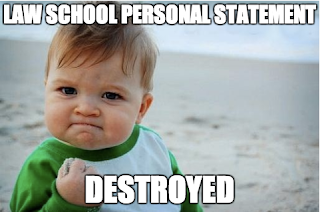Below is an excerpt from The Art of the Law School Personal Statement by Michelle Fabio.
***
Before narrowing down that final topic for your personal statement, look at these below that you’re better off avoiding entirely or at least being extremely careful when writing about.
1. Low LSAT Score
Your LSAT score is in your file; if it’s low, never draw more attention to it in a personal statement. A low LSAT score because of a unique extenuating circumstance may be an appropriate topic for an addendum (more on that in Chapter Ten), but it’s difficult to imagine a situation in which it would be a good personal statement topic.
Remember, your personal statement is your chance to sell yourself, so write an outstanding essay highlighting why you’d be such a wonderful addition to the entering class. Leave the LSAT score out of it.
2. Low College Grades
Along the same lines as the low LSAT score discussion, your grades are listed on your transcript, which adcomms will receive, so don’t put a neon flashing light on your C- in Thermodynamics.
Again, if you feel there is a strong reason to attempt to explain low grades, think about doing so in an addendum (again, more fully discussed in Chapter Ten).
3. Politics
One of the questions in the brainstorming exercises asks you to consider your special interests, and for many of you, one of those is likely politics. Your experience in politics is a potentially good personal statement topic, but be careful on how you frame it.
Even if you think you’re pretty sure about an adcomm’s political leanings, it’s best to stay away from overly partisan personal statements. Your essay shouldn’t become a position paper on controversial issues such as the death penalty, abortion, war, etc. Aside from not talking about you enough (remember we want the personal statement to be personal), such an essay could risk offending an adcomm with your fiery writing on a topic close to your heart.
On the other hand, if you have worked for a politician or in depth on a particular issue and that experience has shaped your desire to attend law school, that could very well make for a great personal statement topic. Overall, though, remember to keep the focus on you and not on the politician or issue.
4. Philosophy
Along the same lines as avoiding politics, don’t use your personal statement to talk about your thoughts on jurisprudence, the role of society in the justice system, etc.
Adcomms don't want philosophical discussions, they want personal statements. Even if you think a philosophical essay represents you well, it is unlikely that you’ve expressed much about yourself personally, which should always be your goal.
A special note on this one: I’ve read many statements over the years that, although not fully philosophical, start out with a generalized proclamation about how the applicant feels about a certain aspect of society or another bland, general philosophical opening sentence.
Bor-ing.
***
See Law School Admission Essay Topics to Avoid for even more advice.
***
Before narrowing down that final topic for your personal statement, look at these below that you’re better off avoiding entirely or at least being extremely careful when writing about.
1. Low LSAT Score
Your LSAT score is in your file; if it’s low, never draw more attention to it in a personal statement. A low LSAT score because of a unique extenuating circumstance may be an appropriate topic for an addendum (more on that in Chapter Ten), but it’s difficult to imagine a situation in which it would be a good personal statement topic.
Remember, your personal statement is your chance to sell yourself, so write an outstanding essay highlighting why you’d be such a wonderful addition to the entering class. Leave the LSAT score out of it.
2. Low College Grades
Along the same lines as the low LSAT score discussion, your grades are listed on your transcript, which adcomms will receive, so don’t put a neon flashing light on your C- in Thermodynamics.
Again, if you feel there is a strong reason to attempt to explain low grades, think about doing so in an addendum (again, more fully discussed in Chapter Ten).
3. Politics
One of the questions in the brainstorming exercises asks you to consider your special interests, and for many of you, one of those is likely politics. Your experience in politics is a potentially good personal statement topic, but be careful on how you frame it.
Even if you think you’re pretty sure about an adcomm’s political leanings, it’s best to stay away from overly partisan personal statements. Your essay shouldn’t become a position paper on controversial issues such as the death penalty, abortion, war, etc. Aside from not talking about you enough (remember we want the personal statement to be personal), such an essay could risk offending an adcomm with your fiery writing on a topic close to your heart.
On the other hand, if you have worked for a politician or in depth on a particular issue and that experience has shaped your desire to attend law school, that could very well make for a great personal statement topic. Overall, though, remember to keep the focus on you and not on the politician or issue.
4. Philosophy
Along the same lines as avoiding politics, don’t use your personal statement to talk about your thoughts on jurisprudence, the role of society in the justice system, etc.
Adcomms don't want philosophical discussions, they want personal statements. Even if you think a philosophical essay represents you well, it is unlikely that you’ve expressed much about yourself personally, which should always be your goal.
A special note on this one: I’ve read many statements over the years that, although not fully philosophical, start out with a generalized proclamation about how the applicant feels about a certain aspect of society or another bland, general philosophical opening sentence.
Bor-ing.
***
See Law School Admission Essay Topics to Avoid for even more advice.




















